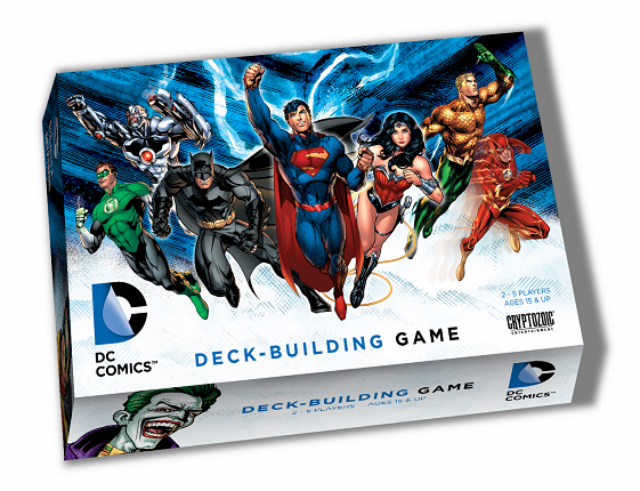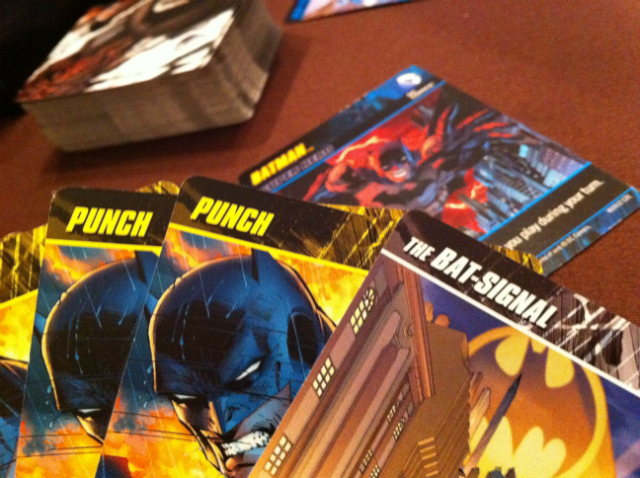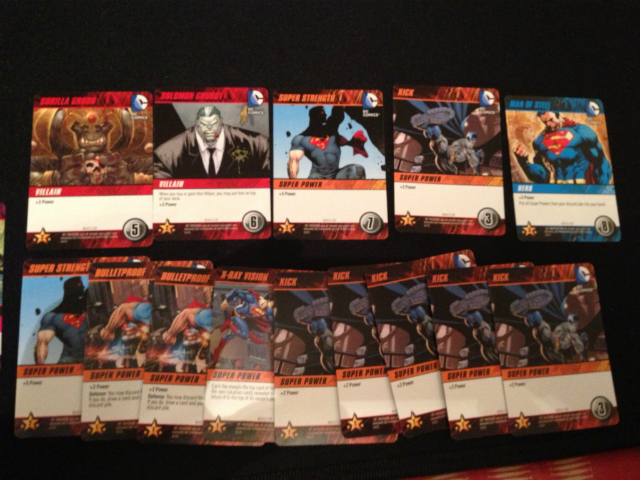DC Comics Deck-Building Game Review
Anyone that knows me knows that I have a profound love of anything related to comic books and the characters that call the funny little tomes their home. So it’s no surprise that when the opportunity to have a look at the recently released DC Comics Deck-Building Game came to me, I readily jumped at the chance. I recently reviewed the Resident Evil Deck-Building Game: Mercenaries and had developed an enjoyment for the card game sub-genre; however, the Resident Evil game was more of a co-operative experience with all of the players working together to beat the “mansion”, and I was ready for a more competitive deck-building experience. That’s exactly what the DC Comics Deck-Building Game offered, and I was ready to accept it with open arms.
The DC Comics Deck-Building game starts off like almost any other deck-building game in the sense that you’ve got to start your deck out of seven punch cards – each of which add a single power to the player’s total – and three vulnerability cards – which do absolutely nothing and only serve to make the player’s deck weak at the start of the game. The aim of the game is to purchase cards from the line-up (a selection of five cards in the centre of the table), a kick card that allows the player to gain two power per move, or, if the player has enough power, a super-villain card. It’s in the player’s best interest to purchase the super-villain cards as soon as they’re able to, as these cards will add the most amount of Victory Points to the player’s total when the game comes to an end. At the end of the game, which happens when there’s either no cards left in the main deck or in the super-villain pile, all players count up how many Victory Points they have, and the winner is – obviously – the player with the most.

This is why DC Comics Deck-Building game is more of a competitive game than a co-operative one. The aim of the game, when it’s boiled down to its bare essentials, is to purchase as many super-villain cards as possible to ensure your own victory, caring very little about the cards or abilities that the other players are getting during their own turns. If you’re lucky enough to get some of the more beneficial cards, you can even force the other players to pick up a Weakness card. These Weakness cards, when counted at the end of the game, force the player that has them to deduct a point from their total Victory Points – so obviously you don’t want to pick up Weakness cards in the first place, or you need to utilise one of the different methods to get rid of them as soon as you can.
The box states that a typical game of DC Comics Deck-Building game will last the players between 30 and 45 minutes but that will, of course, depend on whether or not all players have a working knowledge of how the game works, as well as how many players there are. The game supports 2-5 players so obviously it will take a little bit longer to get to the end if there are more players taking part in it. In the couple of games we played, we found that the game took a little bit longer than the time advertised on the box, usually lasting about 90 minutes, but we were enjoying ourselves and not rushing, so everyone’s experiences may vary. Still, as with most deck-building games, if you’re pushed for time it might be a better idea to wait until you’ve got the time to sit back, relax and really enjoy the game for what it is.

While the aim of the game, or at least the easiest way to ensure a win for yourself, is to purchase as many super-villain cards as you can – as they’re worth more Victory Points during the end game – there’s also a risk to be considered when purchasing them. Whenever a player buys the super-villain from the top of the deck, an unknown super-villain from underneath it must then be turned over, and this super-villain will have an effect that’s activated the moment it’s revealed to the players. This effect usually has all of the players performing some task that they don’t want to do, such as taking a Weakness card, discarding their entire hand or some other dastardly deed. So while it’s beneficial to purchase/defeat the super-villains in order to win the game, be warned: doing so could result in you having to destroy some of the better cards in your deck. It’s not all fun and games when you’re taking on the likes of Sinestro, Parallax and Darkseid (not true, it is literally fun and games).
One of the more interesting aspects of the DC Comics Deck-Building Game – although something that, at the time of writing, we couldn’t take part in – is the fact that the game makes use of the Cerberus: Heroes Engine which, according to the box and the Cryptozoic website, will allow players to combine other Cerberus: Heroes Engine games to create an absolutely massive battle that crosses universes and takes in super-heroes and super-villains from all of the different comic book publishers. At the time of writing, however, the DC Comics Deck-Building game is the only one that has been released, so we were unable to play about with this idea. Still, the concept is intriguing and if it plays as well as it sounds, it could lead to some pretty interesting gaming nights in the Baker household.

Even the box that the DC Comics Deck-Building Game comes in has had a lot of thought put into it. The innards of the box have several different sections for all the different areas of the game’s layout. Different sections for the Super-Villains, Weakness, Punch, Kick and Vulnerability cards are all laid out, making setting up the game extremely quick and painless once you’ve sorted all of the cards out for the first time. Even the instruction manual that explains all of the rules – which are relatively simple as far as deck-building games go – is the size and shape of an actual comic book, lending an extra level to the aesthetic of the whole package.
VERDICT: DC Comics Deck-Building Game is much easier to get into than the Resident Evil Deck-Building Game: Mercenaries we reviewed a couple of weeks back. The matches are much quicker to get through too, which may be a good thing or a bad thing depending on the way you’re looking at it. If you’re a fan of comic books, and a fan of deck-building games in general, then you’re no doubt going to get a kick out of what you’re getting here. Add to that the fact that you can add in other deck-building games that make use of the Cerberus: Heroes Engine and you’ve got the potential to play out some battles that even the publishers of the comics themselves have always been scared to make a reality. The whole presentation has been put together with love and attention and the game itself is fun from beginning to end. If you even have a passing interest in what’s on offer here, make the leap. You won’t regret it.




